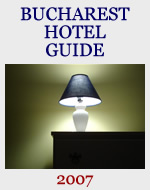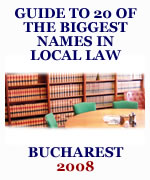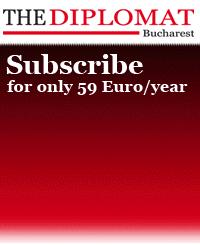Shock popularity due for Euro elections
Romania could witness an unprecedented event in the EU – a popular European election. People may not understand the main issues or know when the vote takes place, but they are damned enthusiastic about it
|
||||||||||||
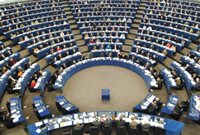 European elections are usually a dull formality in most member states. Hardly any people turn out and even fewer know the name of their representatives in Strasbourg. For Romania’s first European elections on 25 November to change its 35 representatives in the European Parliament, there is almost zero public information and the major European issues see little debate. But nearly half of the people are interested in coming out to vote.
European elections are usually a dull formality in most member states. Hardly any people turn out and even fewer know the name of their representatives in Strasbourg. For Romania’s first European elections on 25 November to change its 35 representatives in the European Parliament, there is almost zero public information and the major European issues see little debate. But nearly half of the people are interested in coming out to vote.
Meanwhile, President Basescu may encourage a greater turnout by booking in a referendum on electoral change on the same day.
This could lead to a European election where around half the people go to the polls, giving a further boost to Romania’s EU-enthusiastic reputation.
The predictions of a favourable turnout are because Romania has become a politically divided nation since 2005 - and 25 November looks set to become a rehearsal for next year’s local and general elections.
“The campaign for the European elections will test the organisational capacity of the parties and their determination to promote projects for a European Romania,” says Corina Cretu, a Social Democrat MEP and future candidate.
Since the 2004 election, the sympathy of the Romanian people has changed. The DA Alliance between the Liberals and Democrats, which propelled President Basescu to power, has split. At the same time, the largest party in Parliament, the Social Democratic Party (PSD), has dropped in popularity, partly due to factionalism and infighting.
Taking advantage of this chaos is the New Generation Party (PNG), led by George ‘Gigi’ Becali, millionaire financier of Steaua football club and advocate of segregated communities for homosexuals. European elections may give his party the first opportunity to gain political power.
President Basescu wanted the European elections to follow a ‘uni-nominal’ system where the electorate votes for a single candidate in a constituency. But he failed to gain backing from Parliament in time for this change. Instead, the system on 25 November will use proportional representation similar to Romania’s general elections. Voters will choose a list of candidates representing political parties.
Most parties officially back a uni-nominal vote or a mixed system with proportional representation, but after six months of debates, the MPs failed to pass the bill. Except for the Democrats, who currently lead in polls, other parties were unsure whether they would gain from the new system.
So, President Basescu decided to launch a national referendum asking people if they want to change their electoral system - on the same day as the European vote.
Prime Minister Calin Popescu Tariceanu has tried to stop the referendum, saying the Government will assume responsibility for passing the draft law. But the Head of State says he will not be fooled by his former colleague and, as Tariceanu knows, it is hard to stop Basescu when he invokes people power.
Even the President of the European Parliament, Hans-Gert Pottering, on a recent visit to Romania, illustrated that there were no legal arguments to stop the organisation of a referendum on the same day as the European-Parliamentary elections.
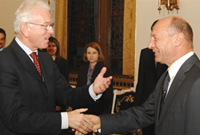 Romania is the most ardent EU supporter of European power. While Euro elections are greeted with indifference in many member states, this summer the Center for Urban and Regional Sociology (CURS) showed that almost half of Romanians respondents were “very interested” or “somewhat interested” in the EP elections.
Romania is the most ardent EU supporter of European power. While Euro elections are greeted with indifference in many member states, this summer the Center for Urban and Regional Sociology (CURS) showed that almost half of Romanians respondents were “very interested” or “somewhat interested” in the EP elections.
“The 46 per cent of people who claim interest in the EP elections do not automatically translate into a 46 per cent turnout,” says Catalin Augustin Stoica, sociologist and general manager of CURS. “Due to voters fatigue and/or lack of interest in the EP elections, the turnout might be lower.”
Because of the headline-grabbing political battles, the campaign for the European elections will probably focus on internal issues, not Macedonia’s accession to the EU or the renunciation of sugar quotas.
Rather than show how the powers of the European Parliament affect the man on the street, candidates will talk up on domestic issues such as low pensions or the woeful healthcare system. These are, ironically, areas in which neither the EP nor the European Commission have ever had any power of interference.
“Themes in the campaign will reflect local or national concerns such as the standard of living, pensions and wages, jobs, healthcare, education, corruption and the absorption of EU funds,” says Stoica. “Speaking only about EU problems might mean speaking in tongues for many voters and lose their attention and votes.”
Instead, politicians will focus on areas for which, if they are voted, they will have little power to change. But Stoica has some optimism. “One should not underestimate voters’ sophistication,” he says. “A good campaign message should address local and national problems, but it should also state how the presence of Romanian politicians in the EP will help solve national problems.”
People should know that 75 per cent of the European legislation is adopted with the approval of both the EP and the Council of the EU. Starting from 2009, when the new Reform Treaty comes into force, all European regulations, including agricultural issues, the European budget and the size of funds given to member states will have to pass through the European Parliament. This body will gain further powers. But such information is unknown to most Europeans.
“European issues aren’t very popular in the western countries and almost all the ten new member states,” says Cristian Pirvulescu, dean of political sciences in the National School for Political and Administrative Studies. “In Romania the situation is much worse, because the prolonged political crisis is stopping voters being informed about what is happening in Brussels.”
There has been little in the way of a public information campaign and the Government has pledged only 350,000 Euro to marketing the elections. A poll last October by Insomar revealed 86 per cent of respondents did not know when the European elections would take place.
Lack of information will mean a low turnout. In all EU member states where large numbers didn’t bother to turn up at the EP elections, extremist parties won more seats than expected.
“After the Polish European elections in 2004, opinion polls showed that almost half of the population did not even know there was an election,” says Krzystof Bobinski, political analyst and former candidate in the Polish EP elections in 2004. “Many thought the MEPs had been selected by the Government or appointed by the Polish Parliament.”
There is also a blase attitude from the central Government. Alfred Bulai, the head of the Agency for Governmental Strategies, has said the election strategy is not to put an “important slant” on stimulating the citizens to vote. He has said people are already informed about the elections awaiting them and the day of voting. This attitude comes despite polls that show that only 14 per cent of people know the election date.
However, the Head of State may have played a trick to ensure voter turnout is more promising by organising the referendum on the same day. The massive rank and file in support of Basescu tend to vote for the Democratic Party (PD). They will use the vote as an opportunity to register their support for him, his referendum and tick a box for the PD while waiting in the booth.
Basescu, who is not allowed to campaign for the elections, can jump on the pro-referendum band wagon. Indirectly, he can then influence voters to turnout for the European vote, this lobbying for the Democrats by proxy.
But the referendum may be dead in the water even if turnout is higher than expected. “I don’t think that the referendum will be valid because more than nine million citizens must vote,” says Pirvulescu, “but the turnout will increase and the smaller parties will have fewer chances to win. The Democrats will profit the most. And even if the referendum fails, this move will speed up electoral reform in Romania.”
Democrats in pole position
On average, opinion polls put the PD ahead on 40 per cent, the PSD second on 20 per cent, followed by the National Liberal Party (PNL) with less than 15 per cent and the New Generation Party (PNG) with ten per cent. The Democratic Union of Hungarians in Romania (UDMR) and the Greater Romania Party (PRM) each have around five per cent. At present, only these parties pass the five per cent necessary to see candidates in the EP.
But these elections might bring some shocks. Pirvulescu believes the PRM might not reach the threshold. This will mean the ‘extremist’ right-wing party in the EP, Identity, Tradition and Sovereignty, would have too few members to form a party. “This would be a pleasant surprise,” says Pirvulescu.
In the place of retreating support for the PRM, the radical victor may be the PNG. “The PNG will bring to the unstable political system even more instability,” says Pirvulescu.
To gain power in the European Parliament each political party should approach a political bloc for membership. The PNG wants to affiliate to the European People’s Party (EPP). However the PD, UDMR and the Christian Democratic National Peasants’ Party (PNTCD) are already members of EPP. The PNG needs the approval of all these three parties to realise its wish.
According to Catalin Dancu, the PNG’s secretary general and number two on their list with candidates, the affiliation to EPP is likely to happen. “I don’t believe there will be a Romanian Party that suicidal to position itself against our affiliation to EPP,” says Dancu. “The UDMR is neutral on this subject so far, PNTCD is inclined to be against us, while the PD has said that when they will be asked, they won’t oppose.”
Furthermore, PNG’s strategist believes that the Hungarians, Democrats and his party might create a good partnership for a future Government after the next general elections.
But the UDMR is not so neutral. “We do not support PNG’s affiliation to EPP,” says Gyorgy Frunda, who tops the Hungarian list of European candidates. “They have not even asked us officially, but I don’t see UDMR in the same Government with PNG. Mr Gigi Becali’s statements are mostly extremist and even directed against the Hungarian community in Romania.”
Report by Ana-Maria Nitoi
National Liberal Party (PNL)
Affiliation: Alliance of Liberals and Democrats in Europe
Strasbourg residents: Six MEPs
Forecast (October): Six MEPs
Perspectives: Liberal candidate and active MEP Adina Valea says that she wants to raise the issue of Romanian citizens’ right to work anywhere in the European Union.
“We know that Italian public opinion tends to be against the Romanians working in Italy, only because of some criminals that have appeared in the local press,” she says. “Our responsibility is to show everyone that not all Romanians are like that.”
New Generation Party (PNG)
Affiliation: Soliciting for European People’s Party (EPP) membership
Strasbourg residents: No MEPs
Forecast (October): Four MEPs
Perspectives: Number two on PNG’s party list Catalin Dancu will focus on improving Romania’s image abroad. He wants to attract more European funds to Romania and ensure Romanian products can be sold more easily in the EU. PNG is the only party announcing they will target Romanian emigrants. PNG leader Gigi Becali is a keen builder of churches and says his party will adopt a religions vote in the EP.
Democratic Union of Hungarians in Romania (UDMR)
Affiliation:
European People’s Party (EPP)
Strasbourg residents: Three MEPs
Forecast (October): Two MEPs
Perspectives: Protecting and promoting the Hungarian minority rights is UDMR’s main objective. Gyorgy Frunda says there is also solidarity in the European Parliament among similar representatives to help bringing minimum standards for minorities in member states. The party will support regional autonomy. “We need 15 to 18 administrative and economic regions and each of them to have its own regional parliament to decide on local problems, such as education, healthcare system, agriculture or environment,” says Frunda. This leaves issues like defence or foreign policy under the national parliament responsibility.
Social Democratic Party (PSD)
Affiliation: Socialist
Strasbourg residents: 12 MEPs
Forecast (October): Seven MEPs
Perspectives: Corina Cretu, PSD MEP, says the party will focus on Romania’s sustainable development, the importance of agricultural sector in the economy, absorbing and investing efficiently European funds, social integration, combating poverty and the consequences of climate change.
Democratic Party (PD)
Affiliation:
European People’s Party (EPP)
Strasbourg residents: Five MEPs
Forecast (October): 14 MEPs
Perspectives: Democratic candidate Maria Petre says that the PD supports European enlargement. But she believes that, at least for the moment, it is not necessary for the integration process to turn into building a European federation. “EU enlargement towards the countries in the western Balkans will take place,” she says. “It is just that the accession moment will come when these states are fully ready for such a step.”
Greater Romania Party (PRM)
Affiliation:
Identity, Tradition, Sovereignty
Strasbourg residents: Six MEPs
Forecast (October): Two MEPs
Conservative Party (PC)
Affiliation: Alliance of Liberal Democrats in Europe
Strasbourg residents: Two MEPs
Forecast (October): No MEPs



